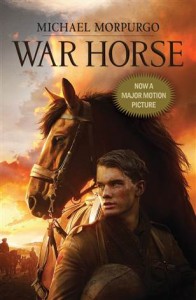 A new film or a stage show will often create a renewed interest for a book. Indeed, one of my recent reads began when the stage show was heavily promoted in the media – ‘War Horse’ by Michael Morpurgo. The book was first published in 1982; it has of course been reprinted to include scenes from the 2011 movie, and has also been adapted to the stage – which the author “they must be mad” to do. As with many good books, there is also an audio version to enjoy.
A new film or a stage show will often create a renewed interest for a book. Indeed, one of my recent reads began when the stage show was heavily promoted in the media – ‘War Horse’ by Michael Morpurgo. The book was first published in 1982; it has of course been reprinted to include scenes from the 2011 movie, and has also been adapted to the stage – which the author “they must be mad” to do. As with many good books, there is also an audio version to enjoy.
In a way reminiscent of Anna Sewell’s ‘Black Beauty’, ‘War Horse’ is told anthropomorphically – from the perspective of a horse. And like Sewell’s Black Beauty, Joey’s ownership changes throughout the tale, and both stories deal with shifts in the horse’s circumstances. This perspective asks the reader to consider how animals are treated and shows how they will respond differently in some situations.
Human weaknesses are shown through Albert’s father (bidding for Joey initially to beat a rival – even though he couldn’t afford him), and through some of the riders who fail to bond with Joey (using him as an onject rather than a sensory animal). Human triumphs are displayed in those who treat their horses humanely and lovingly – and hence, get the best the horses can offer. Bonds of friendship are also emphasised – ties between horse and man, as well as horse and horse, develop throughout the tale.
Initially set in the English countryside, ‘War Horse’ introduces the gradual creep of wartime struggles. At first, times are hard financially for Joey’s farming owners. The distant war comes closer to home, as villagers suffer family losses – and the sale of Joey for military purposes also illustrates this creep. Joey also describes the adversities faced by both civilians and soldiers closer to the warfront in France, through his eyes and through lost relationships.
‘War Horse’ is a book to be enjoyed by animal lovers as well as those who would like a different persective on war – seen through the eyes of a horse yes, but perhaps reflections from the little man rather than a historian. In Michael Morpurgo’s words:
“let the horse tell the story, through the eyes of the British… the Germans, then through the French. That way, you have some of sense of the universal suffering that took place in that war.” (from the video interview below)
Much of my ‘reading’ was done in the car via an audio version, though I still felt the need to touch base with the book from time to time. The audio reading was enhanced by the accents (English, German, French and Welsh) supplied by narrator, John Keating. From all accounts, the stage play is also magnificent – if only I had tickets!
Which of the many ‘wonderful adaptations’ of War Horse’ do you like best?
Are there other similarities you could draw between War Horse and Black Beauty?